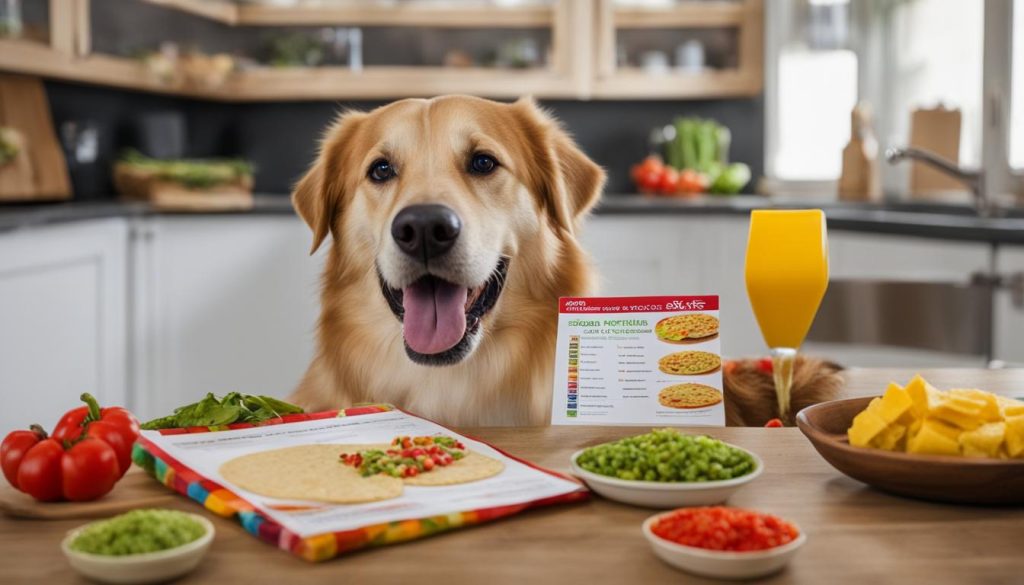As a professional copywriting journalist, I’m here to provide you with accurate and reliable information about whether dogs can eat tortillas. Many pet owners wonder if sharing this popular human food with their furry friends is safe and beneficial. In this article, I will delve into the details of tortilla consumption for dogs and explore the potential risks and benefits involved.
While it may be tempting to share your delicious tortilla with your canine companion, it’s essential to consider a few factors before doing so. Let’s uncover the truth about whether dogs can safely enjoy this food and what precautions you should take to keep them healthy.
Key Takeaways:
- Dogs can safely eat tortillas in moderation, but it’s crucial to consider their individual health needs and consult with a veterinarian.
- Tortillas made from corn or wheat flour are generally safe for dogs unless they have an intolerance or allergy to these ingredients.
- Tortillas do not provide significant nutritional value to dogs and can contribute to weight gain and other health issues if consumed in excess.
- Avoid feeding tortillas with additional toppings or fillings, as these may cause digestive issues or allergic reactions in dogs.
- It’s always best to prioritize a balanced and complete dog diet that includes appropriate dog food.
Are Tortillas Good For Your Dog’s Health?

Tortillas, whether made from corn or wheat flour, do not offer many nutritional benefits to dogs. They are high in carbohydrates and can contribute to weight gain if overfed. Corn tortillas contain minerals such as magnesium, potassium, and phosphorus, but these amounts are not significant enough to provide substantial health benefits to dogs. It’s important to prioritize a balanced and complete dog diet that includes appropriate dog food rather than relying on tortillas for their nutritional needs.
Feeding dogs a diet primarily based on tortillas can lead to nutritional deficiencies and health issues. Dogs require a diet that is rich in protein, vitamins, and minerals to support their overall health and well-being. Tortillas lack essential nutrients such as omega-3 fatty acids, calcium, and vitamin D, which are crucial for dogs’ bone health, immune system, and overall development. Additionally, tortillas are low in fiber and can lead to digestive problems and constipation in dogs.
While tortillas can be enjoyed as an occasional treat for dogs, they should not be a staple in their diet. It’s important to remember that dogs have specific dietary requirements that differ from humans. Instead of relying on tortillas as a source of nutrition, pet owners should focus on providing their dogs with high-quality dog food that is specifically formulated to meet their nutritional needs. Consulting with a veterinarian is always recommended to ensure that dogs are getting the proper nutrition for their individual needs.
| Tortilla Ingredients | Nutritional Value |
|---|---|
| Corn Flour | Minimal nutritional value |
| Wheat Flour | Minimal nutritional value |
| Processed Additives | Potential harm to dogs |
| Cheese, Salsa, Spices | Digestive issues or allergic reactions |
“Tortillas lack essential nutrients such as omega-3 fatty acids, calcium, and vitamin D, which are crucial for dogs’ bone health, immune system, and overall development.”
Tortilla Ingredients: Toxic to Dogs?

While tortillas themselves are not usually toxic to dogs, certain ingredients commonly found in tortillas can be harmful.
Processed tortillas may contain additives, preservatives, and seasonings that can be problematic for dogs. These additional ingredients can cause digestive issues and allergic reactions in some dogs. It’s important to read the ingredient label carefully before feeding tortillas to your dog.
Some dogs may also have allergies or sensitivities to corn or wheat, which are common ingredients in tortillas. Dogs with these allergies should avoid tortillas altogether to prevent adverse reactions.
Table: Harmful Ingredients in Tortillas for Dogs
| Ingredient | Potential Harm |
|---|---|
| Artificial additives | May cause digestive issues |
| Preservatives | May be toxic in large quantities |
| Seasonings (e.g., garlic, onion, spices) | Can cause digestive upset or toxicity |
To keep your dog safe, it’s best to stick to plain tortillas without any added ingredients or seasonings. If you’re unsure about a specific ingredient, consult with a veterinarian before giving it to your dog.
Note: This article is for informational purposes only and should not replace professional veterinary advice. If you have concerns about your dog’s diet or health, consult with a veterinarian.
When Are Tortillas Okay For Dogs To Eat?

Feeding tortillas to dogs should be done with caution and in moderation. While tortillas made from corn or wheat flour can be safe for dogs to consume, it is essential to consider certain factors before including them in their diet. Dogs that do not have wheat or corn allergies or intolerances can enjoy tortillas as an occasional treat.
When offering tortillas to dogs, it is important to cut them into small, bite-sized pieces to prevent choking hazards. This is especially crucial for smaller breeds. Monitoring your dog for any allergic reactions or digestive issues after consuming tortillas is also advised. If your dog experiences any adverse reactions, it is best to avoid feeding them tortillas altogether.
“Feeding tortillas to dogs should be done with caution and in moderation.”
Feeding Recommendations for Dogs
| Tortilla Types | Feeding Recommendations |
|---|---|
| Corn tortillas | Provide occasional treats in small, bite-sized pieces. |
| Wheat tortillas | Limit consumption due to higher fat content. |
It is important to consult with a veterinarian before introducing tortillas or any human food into your dog’s diet. They can provide personalized advice based on your dog’s specific needs and dietary requirements.
Remember, tortillas should never replace a balanced and complete dog diet. They should only be a supplemental snack or occasional treat. Prioritizing a nutritionally balanced dog food and consulting with a veterinarian are key to ensuring your dog’s overall health and well-being.
- Can Dogs Eat Tortillas? – American Kennel Club
- Feeding Dogs: Can Dogs Eat Tortillas? – Healthy Paws Pet Insurance
Can Dogs Eat Tortilla Chips?

Dogs are often curious about the foods their owners eat, and it can be tempting to share a tasty snack like tortilla chips. However, it’s important to consider whether tortilla chips are safe for dogs to consume. In general, tortilla chips are not recommended for dogs due to several reasons.
Firstly, tortilla chips are typically high in salt, fat, and seasonings, which can be harmful to dogs. Excessive sodium intake can lead to dehydration and other health issues in dogs. The added fat and seasonings in tortilla chips can also cause digestive problems and may even trigger allergic reactions in some dogs.
Furthermore, the crunchy texture of tortilla chips poses a choking hazard, especially for smaller dog breeds. The sharp edges of the chips can cause injuries to the mouth, throat, or digestive tract if not chewed properly. Please be aware that even if your dog manages to chew and swallow tortilla chips without any immediate issues, the potential long-term health risks outweigh the momentary enjoyment.
“Tortilla chips are not recommended for dogs due to their high salt, fat, and seasoning content, as well as the choking hazards they present.”
Instead of offering tortilla chips to your furry friend, opt for safe alternatives that won’t jeopardize their health. Plain, small pieces of tortillas made from corn or wheat flour can be a better option, as long as your dog doesn’t have any allergies or intolerances to these ingredients. However, it’s crucial to keep in mind that even plain tortillas should be given in moderation, as they do not provide significant nutritional benefits to dogs.
Remember, always consult with your veterinarian before introducing any new food into your dog’s diet. They can provide personalized advice based on your dog’s specific needs and ensure that their nutritional requirements are being met.
Health Risks of Feeding Tortillas to Dogs
Feeding tortillas to dogs in excess can have several negative health effects. The high carbohydrate content in tortillas can contribute to weight gain and obesity in dogs, increasing the risk of medical conditions such as diabetes and heart disease. Additionally, processed tortillas may contain ingredients that can cause gastrointestinal issues or allergies in dogs. It is crucial to prioritize a balanced and nutritious diet for your dog and limit the consumption of tortillas to mitigate these health risks.
In terms of nutritional value, tortillas made from corn or wheat flour do not provide substantial benefits to dogs. They are high in carbohydrates but lack essential nutrients that dogs need for optimal health. Feeding tortillas as a regular part of a dog’s diet can lead to nutritional deficiencies and imbalances. Therefore, it is important to provide dogs with a complete and balanced dog food that meets their specific dietary needs.
Potential Risks of Feeding Corn Tortillas to Dogs:
- Digestive Issues: Dogs may have difficulty digesting the cornmeal in tortillas, which can lead to digestive problems such as diarrhea and vomiting.
- Allergic Reactions: Corn is a common allergen for dogs, and feeding corn tortillas can trigger allergic reactions, including skin irritations and itching.
- Weight Gain: The high caloric content of tortillas can contribute to weight gain and obesity in dogs, which can lead to various health issues.
- Harmful Ingredients: Processed tortillas may contain additives, preservatives, and seasonings that can be harmful to dogs and cause gastrointestinal issues.
- Choking Hazard: The dry and brittle texture of corn tortillas can pose a choking hazard, especially for smaller dog breeds.
It is important to be aware of these potential risks and avoid feeding corn tortillas to dogs in excessive amounts. Instead, focus on providing a well-balanced diet that includes appropriate dog food and consult with a veterinarian for personalized dietary recommendations for your dog.
Alternatives to Corn Tortillas for Dogs’ Diet
If you’re looking for alternatives to corn tortillas for your dog’s diet, there are several options to consider. These alternatives can provide variety and nutritional benefits to your furry friend’s meals. Here are some dog-friendly tortilla alternatives:
Brown Rice Tortillas
Brown rice tortillas can be a great option if your dog has a gluten intolerance or sensitivity. They are made from whole grain brown rice, which is a healthier alternative to corn or wheat. These tortillas are free from gluten and can provide fiber and essential nutrients for your dog’s digestive health.
Whole Wheat Tortillas
If your dog doesn’t have a wheat allergy or sensitivity, whole wheat tortillas can be a suitable alternative. They are made from whole wheat flour, which contains more fiber and nutrients compared to refined wheat flour tortillas. However, it’s important to remember that whole wheat tortillas should still be fed in moderation.
Homemade Tortillas
Making homemade tortillas allows you to control the ingredients and customize them to meet your dog’s specific dietary needs. You can use alternative flours such as chickpea flour or coconut flour to make tortillas that are suitable for dogs with specific allergies or dietary restrictions. Homemade tortillas can be a healthier and safer option for your dog.
When introducing these tortilla alternatives into your dog’s diet, remember to do so gradually and in moderation. Monitor your dog’s reaction to ensure they tolerate the new food well. Always consult with your veterinarian before making any significant changes to your dog’s diet.
Tips for Feeding Corn Tortillas to Dogs Safely

Feeding corn tortillas to dogs can be done safely by following these tips:
- Choose plain tortillas: Opt for plain tortillas made from corn or wheat flour without any added ingredients or seasonings. This helps to avoid potential digestive issues or allergies.
- Moderation is key: Serve tortillas to your dog in moderation. They should be treated as an occasional treat rather than a regular part of their diet.
- Cut into bite-sized pieces: To prevent choking hazards, cut the tortillas into small, bite-sized pieces before feeding them to your dog.
- Avoid additional toppings or fillings: Steer clear of tortillas with additional toppings or fillings such as cheese, salsa, or spices. These can be harmful to dogs and may cause digestive issues or allergic reactions.
- Monitor for allergic reactions and digestive issues: After feeding your dog tortillas, closely monitor them for any allergic reactions or digestive issues. If you notice any adverse symptoms, consult with a veterinarian for guidance.
Example Table: Nutritional Comparison of Corn Tortillas and Wheat Tortillas for Dogs
| Nutrient | Corn Tortillas | Wheat Tortillas |
|---|---|---|
| Protein | 1.9g | 4.6g |
| Fat | 0.6g | 2.0g |
| Carbohydrates | 13.4g | 18.2g |
| Fiber | 1.7g | 2.7g |
| Calcium | 2mg | 13mg |
| Iron | 0.7mg | 1.1mg |
Note: Nutritional values may vary depending on the brand and specific ingredients used in the tortillas. It’s always important to read the label and consult with a veterinarian for accurate information related to your dog’s specific dietary needs.
Potential Risks of Feeding Corn Tortillas to Dogs

Feeding corn tortillas to dogs can pose several risks that owners should be aware of. Dogs may have difficulty digesting the cornmeal found in tortillas, which can lead to digestive issues such as diarrhea and vomiting. Additionally, corn is a common allergen for dogs, and feeding corn tortillas can potentially trigger allergic reactions.
The high caloric content of tortillas can also be problematic for dogs, as it can contribute to weight gain and increase the risk of obesity. It’s important for dog owners to be mindful of their pet’s calorie intake and not overfeed them with tortillas or any other high-carbohydrate foods.
Furthermore, tortillas often contain sodium and seasonings, which can be harmful to dogs. Excessive sodium consumption can lead to salt poisoning, and certain seasonings can be toxic to dogs. It’s crucial to avoid tortillas with added ingredients or seasonings and opt for plain tortillas instead.
Table: Risks of Feeding Corn Tortillas to Dogs
| Risks | Description |
|---|---|
| Difficulty Digesting Cornmeal | Dogs may experience digestive issues such as diarrhea and vomiting due to the cornmeal in tortillas. |
| Allergic Reactions | Corn is a common allergen for dogs, and feeding corn tortillas can potentially trigger allergic reactions. |
| Weight Gain and Obesity | The high caloric content of tortillas can contribute to weight gain and increase the risk of obesity in dogs. |
| Sodium and Toxic Seasonings | Tortillas often contain sodium and seasonings that can be harmful to dogs, leading to salt poisoning or toxicity. |
Given these risks, it’s important for dog owners to exercise caution when feeding corn tortillas to their pets. If you choose to give your dog tortillas as an occasional treat, ensure that they are plain, without any added ingredients or seasonings. Additionally, always monitor your dog for any adverse reactions or digestive issues after consuming tortillas and consult with a veterinarian if you have any concerns.
Wrapping Up
In summary, while dogs can safely eat tortillas in moderation, it is important to consider their nutritional value and potential health risks. Tortillas made from corn or wheat flour are generally safe for dogs, unless they have allergies or intolerances to these ingredients. However, tortillas do not provide significant nutrients to dogs and can contribute to weight gain if consumed in excess. Therefore, it is advisable to consult with a veterinarian before including tortillas in your dog’s diet.
It is important to prioritize a balanced and complete dog diet that includes appropriate dog food. While plain tortillas made from corn or wheat flour are generally safe options, it is crucial to avoid tortillas with added ingredients or seasonings. These additional toppings or fillings may cause digestive issues or allergic reactions in dogs. Monitoring your dog for any allergic reactions or digestive issues is essential, and seeking personalized advice from a veterinarian is always recommended.
To ensure the safety of feeding tortillas to dogs, it is best to serve them in small, bite-sized pieces to prevent choking hazards. Cutting tortillas into appropriate sizes and avoiding processed tortillas with potentially harmful additives or preservatives can help minimize potential risks. By following these guidelines and considering your dog’s individual needs, you can safely incorporate tortillas into their diet as an occasional treat.
FAQ
Can dogs safely eat tortillas?
Dogs can safely eat tortillas in moderation, but it’s important to consider a few factors.
Are tortillas good for your dog’s health?
Tortillas do not offer many nutritional benefits to dogs and can contribute to weight gain if overfed.
Do tortilla ingredients pose a risk to dogs?
While tortillas themselves are usually not toxic to dogs, certain ingredients commonly found in tortillas can be harmful.
When are tortillas okay for dogs to eat?
Tortillas should be given to dogs only in moderation and as an occasional treat, after consulting with a veterinarian.
Can dogs eat tortilla chips?
Tortilla chips are not recommended for dogs as they are often high in salt, fat, and seasonings that can be harmful.
What are the health risks of feeding tortillas to dogs?
Feeding tortillas to dogs in excess can lead to weight gain, obesity, and other health issues.
What are the alternatives to corn tortillas for dogs’ diet?
Brown rice tortillas, whole wheat tortillas, homemade tortillas, and lettuce wraps can be alternatives to corn tortillas for dogs.
What are the tips for feeding corn tortillas to dogs safely?
Choose plain tortillas, serve in moderation, cut into small pieces, and monitor for allergic reactions or digestive issues.
What are the potential risks of feeding corn tortillas to dogs?
Dogs may have difficulty digesting cornmeal, leading to digestive issues and allergic reactions. The high-calorie content and texture can also pose risks.
What should I conclude about dogs eating tortillas?
Dogs can eat tortillas in moderation, but they should not be a staple in their diet. Consult a veterinarian for personalized advice.






